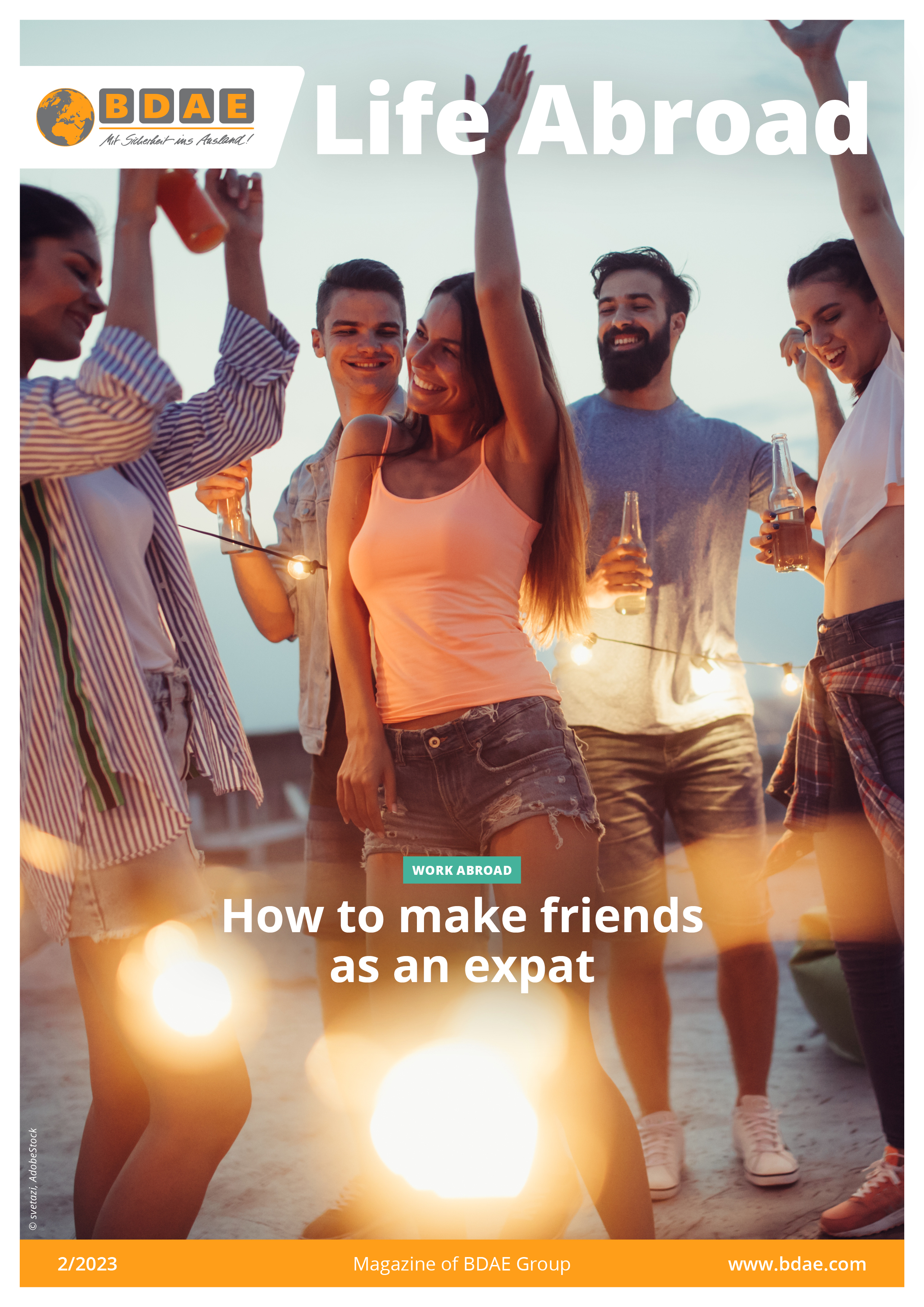"Those who want to advance their careers risk pushing their life dreams ahead of them until they eventually lack the energy for them."
Claudio Sieber left behind his settled life in Switzerland, travelled around the world, and spent a long time in Southeast Asia. He documented his travel experiences in his book "Stranded in Paradise."
In the interview, he tells us, among other things, how he coped with leaving Swiss society, what traveling taught him, and why he chose Siargao in the Philippines as his new home.
Living in Switzerland with a job as a marketing and sales professional doesn't sound bad at all. What led you to give all that up and leave your friends and family behind?
Claudio: It was undoubtedly an exciting time and I’m happy to have lived it. The problem with success, as well as with routine, is that you don't even notice how the years go by. This phase of life was certainly an important part of the mosaic. Without that early career, I wouldn't have been able to save up the necessary funds, nor would I have understood the mechanisms of our achievement-oriented society. In Switzerland, we are impeccably organized, ambitious, and efficient, but often at the expense of leisure. Once you reach a certain position, you can forget about working less. So, you embark on sort of a straight course towards retirement? Fortunately, I realized in time that I would be speeding through my life on autopilot. The societal corset in Switzerland was simply too tight for me. I longed for more adventure, more chaos, more peculiar things, but above all, more time to explore the various facets of this world. One thing is clear: those who want to advance their careers risk pushing their life dreams ahead of them until they eventually lack the energy for them.
My mother and my friends accepted that I wanted more, or rather something different, from life. Friends are for life, they say, even though I couldn't nurture my friendships much in recent years, during our recent reunions, I felt the same emotional connection as if I had never renounced Switzerland. Magical decisions are made when you're over 30 - many of my closest friends have become responsible parents, while I have become a globally aware traveller without children. Our stories of experiences leave both parties amazed.
How did you leave Switzerland? Was there a kind of travel plan or roadmap for your exit?
Claudio: My journey of stepping out is actually very Swiss. The departure was planned well in advance, precisely 7 years before my departure. Only then could I save up the necessary financial cushion. It gave me the security that I could travel worry-free for three to four years. My savings plan at that time involved moving to a tax-friendly municipality and living less extravagantly. So, only one coffee per day, drinking tap water, cooking for myself, hardly buying new clothes, going out less, and so on. A minimalist lifestyle, in short. I had a rough travel route planned for the first two years (South America, USA, Japan, South Korea, China, and India).
However, in Nepal, for various reasons, I realised that I wanted to take a new course and most likely would not return to Switzerland. Therefore, the book begins in Nepal, which is synonymous with my new chapter in life.
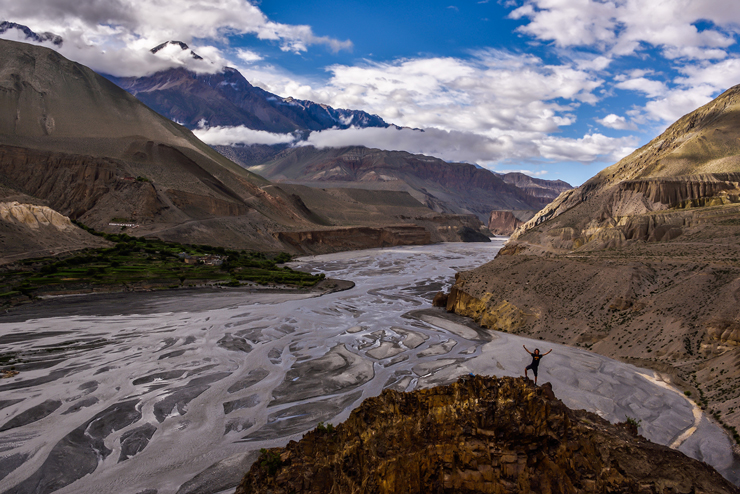 Unparalleled panorama at Jamson after descending from the Thorong-La Pass (Annapurna Mountain Range) in the Nepalese Himalayas. © Claudio Sieber
Unparalleled panorama at Jamson after descending from the Thorong-La Pass (Annapurna Mountain Range) in the Nepalese Himalayas. © Claudio Sieber
Did you have any concerns about leaving everything behind?
Claudio: For the first 30 years of my life, Switzerland was my home. It took a lot of courage to renounce this beautiful and perfectly organized place. That's mainly because I had to say goodbye to familiar habits and supportive people. Suddenly, everything is turned upside down. No more structure, the feeling of security diminishes, and you feel uprooted. But eventually, if you're lucky, euphoria sets in as you gradually realize that there are other ways to live.
What do you think is important to consider when leaving everything behind and moving to the world?
Claudio: Detaching yourself from a country, a profession, and your environment requires a lot of energy. It took away quite a few days of my life. The exit should be carefully planned, and that will pay off later.
Traveling is wonderful, but it also comes at a cost. There must have been a moment when your financial cushion ran low. What role does money play for you?
Claudio: Money is synonymous with security, but it's also a key to unlocking the door to the unknown. Instead of accumulating more junk, I consider myself fortunate to spend my money in places (shops, accommodations, etc.) where people have less. When I mention Switzerland to Asians, their jaws drop. "So much natural beauty combined with a human desire for perfection and prosperity. Wow, you're lucky." Asia dreams of Switzerland, just as we romanticize exotic Asia. Switzerland is flawlessly organized, impresses with its economic stability, direct democracy, and cultural diversity in a small space. However, everything is a bit too perfect for my taste. Our pursuit of perfection has led to more prosperity but not necessarily more well-being. In many parts of Asia, people live more in the present (often out of necessity), smile more often, and are content with significantly less. That lightens my spirit day in and day out.
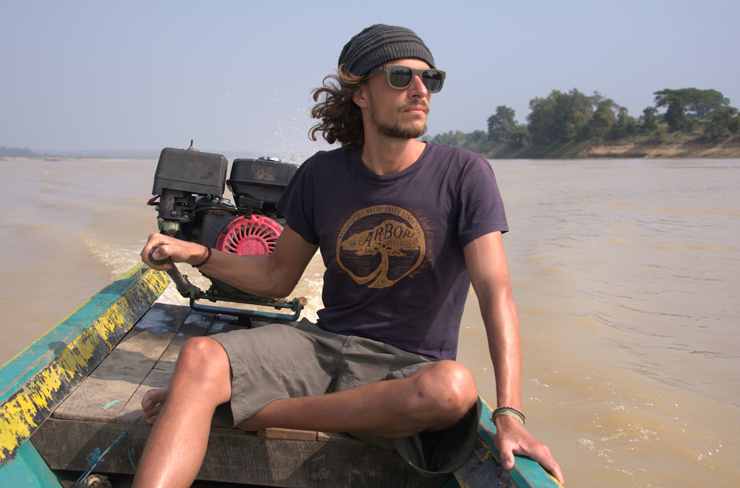 Navigating the Chidwin River on a wooden boat on the way towards the Andaman Sea. © Claudio Sieber
Navigating the Chidwin River on a wooden boat on the way towards the Andaman Sea. © Claudio Sieber
"The way I travel means that I often have to put my fate in the hands of strangers and see what happens."
During your years of traveling, you also ventured to the American and South American continents, as well as to Japan, South Korea, and eastern Asia. What is special about Asia/Southeast Asia for you?
Claudio: What fascinates me most about Asia/Southeast Asia is its diversity. The culture, the food, the landscapes, and even the people vary from country to country. However, what all people have in common is their hospitality. In Asia, even strangers are usually treated with respect almost everywhere, and people greet each other with a smile. Here, spirituality and traditional customs are still experienced up close. That alone fascinated me. In simple terms, I wanted to combine adventure with cultural highlights. It was essential for me to explore the countries of Southeast Asia as slowly as possible—there is even a term for it now: "Slow Travel." So no tour guides, no tour groups, only using transportation that locals use, and getting as close as possible to the people. In doing so, I never knew how my day would end or with whom I would spend the night. Fascinating encounters and stories naturally unfolded. In my style of traveling, I often put my fate in the hands of strangers and see what happens. I have experienced genuine hospitality countless times through this approach. For example, I hitchhiked in Malaysia, and one of the drivers who picked me up told me after five minutes in the car that he was getting married the next day and promptly invited me to his wedding.
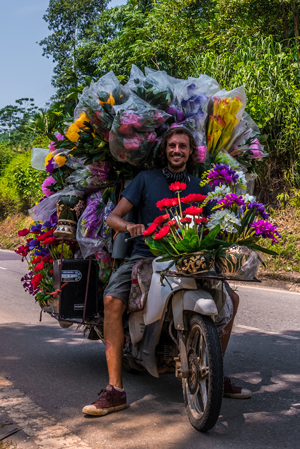 A fully loaded motorbike, the flower express. On Sundays, the small town of Bac Ha in the province of Lào Cai in the northeast of Vietnam mutates into a market. © Claudio Siebe
A fully loaded motorbike, the flower express. On Sundays, the small town of Bac Ha in the province of Lào Cai in the northeast of Vietnam mutates into a market. © Claudio Siebe
Southeast Asia is constantly changing, and travellers from countries like Switzerland and Germany can experience development up close here. Pension funds and retirement are practically nonexistent, and few people trust their own government. Family values and personal well-being are therefore central. Despite all the challenges faced by locals, strangers can perceive an incredible lightness in Southeast Asia. It's just that most people are friendly and willing to help. That's something that is often underestimated (laughs).
Was there a country that you found particularly challenging or a specific situation?
Claudio: Overall, the modern nomad experiences a mix of rewards and challenges. I never made it easy for myself, so all destinations were challenging. Before my departure, I couldn't ride a motorcycle or horseback ride. But you can learn all of that quickly in Asia. I also never hitchhiked before. Even wooden boats are affordable and can be sold later. However, I also liked the idea of not knowing where I would end up at the end of the day. It was time to gather new experiences. It was important for me to travel as the locals do. Mobility in the Far East is not on par with many places in Europe. For example, scooters are still one of the most important means of transportation. This means that being near the people by having your own (or borrowed) motorcycle is possible. The locals greatly appreciate that you take the time to explore their homeland, and they constantly reciprocate with goodwill.
Did you experience wanderlust for "home" at times?
Claudio: Definitely. After three years of being a nomad, I was already drawn back to my old home for a travel break. And after another five years of missing Switzerland, the thought of visiting again warmed my heart. It finally happened last summer. Embracing my mother again, laughing through the nights with friends, punctual transportation, alpine air, extravagant cheese counters, and talented bakers. After so many years in Southeast Asia, a visit to Switzerland was almost like culture shock—everything is so perfect, and the fast pace is palpable.
"The world is not as dangerous as it seems or as the media wants us to believe."
Was there a moment when you wanted to quit the adventure?
Claudio: Of course, there were moments when I thought, "I've had enough!" For example, in the Nepalese mountains, where my naivety almost cost me my life, or during the monsoon in Cambodia when it rained incessantly for 400 kilometers of motorcycling. Or during illnesses like in Papua New Guinea when I contracted malaria. Long-term travel is all about these ups and downs, experiencing various emotions (including the negative ones) and learning something about oneself and others.
"I personally understand 'long-term happiness' as a fulfilling life."
What is the most important thing you have learned for yourself through your travels?
Claudio: Being happy doesn't necessarily mean being constantly in a good mood. It's important to differentiate between short-term and long-term happiness. When it comes to fleeting joys, where the neurotransmitter dopamine takes the reins, I'm satisfied with catching a good wave, engaging in deep conversations, or having the confidence that I'll probably be able to spend the rest of my life in swim trunks and flip-flops (yes, our island dress code, so to speak).
However, I first had to escape the quicksand of routine. My "well-being," as my departure from the rigorous performance-oriented society has taught me, is the freedom to have control over my time - the flexibility to decide when and how I want to do things, when to wake up, when to leave things unfinished. Honestly, I've never liked orders and alarm clocks. Additionally, I want to constantly reinvent myself in order to fully enjoy the already short life. That, combined with physical health, a strong community, and financial security, makes me sustainably happy.
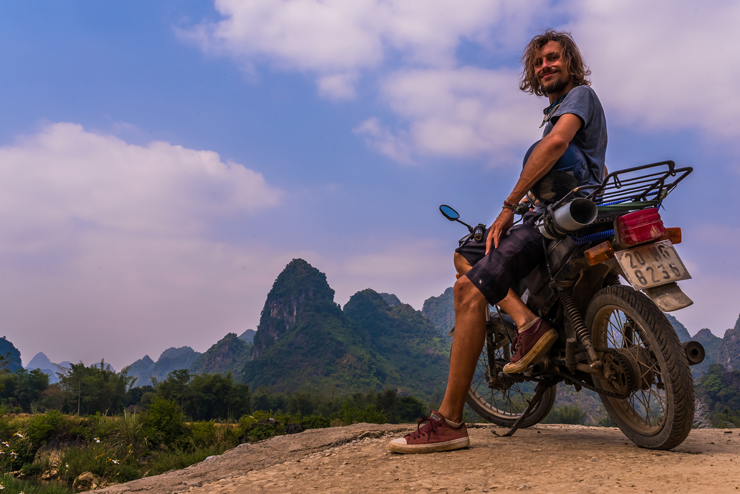 Claudio with his unreliable companion "Frankenstein" in the Vietnamese province of Cao Bằng. © Claudio Sieber
Claudio with his unreliable companion "Frankenstein" in the Vietnamese province of Cao Bằng. © Claudio Sieber
In 2018, Siargao Island in the Philippines became your home. Why specifically this island and the place?
Claudio: Hmmm, on a superficial level, because living near the beach is simply amazing, and all those coconut palm trees constantly give me a vacation vibe (even though they flew at us almost a year ago). Here, I can lead a cost-effective life in harmony with nature, with plankton and fireflies at my doorstep, along with the warmest people in Asia. Interestingly, the Philippines was my last travel destination in the Far East. If I hadn't settled here, I would probably have ended up in Zanzibar eventually. I wanted to contemplate my future on the surf island of Siargao. A one-week break was planned, but I got stuck for a month. I had met so many interesting people in a short period, locals, and expatriates. They quickly became friends, especially because we have the same expectations in life. Then the pandemic came, and I had to make a decision: Do I leave this paradise, knowing that I probably won't be able to come back anytime soon with my tourist visa? Or do I stay and put down new roots?
It's quite ironic because the island has a lot in common with my hometown, St. Gallen. Everyone knows each other and knows what the others are up to. Only here, instead of apple trees, there are palm trees, and instead of being surrounded by hills, we're surrounded by water. Families here ride motorcycles with four people instead of driving station wagons.
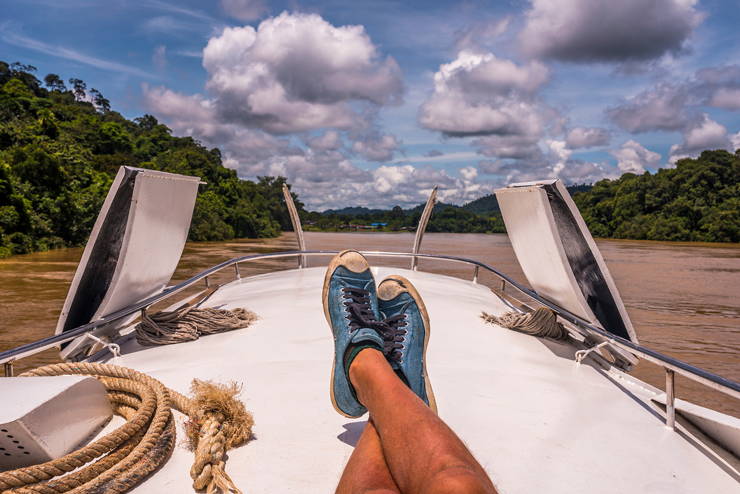 On deck along the Rajang River in the Malaysian state of Sarawak. © Claudio Sieber
On deck along the Rajang River in the Malaysian state of Sarawak. © Claudio Sieber
How do you spend your time in paradise?
Claudio: There's no typical daily routine. Whether it's Monday or Friday tomorrow, it couldn't matter less to me. Aside from my morning coffee and visa runs, I've abolished any routines.
"An unpredictable day is a good day."
And Siargao gives me a good dose of "unpredictability" every day because nothing and no one can be relied upon here. But in general, I often go surfing, cruise through the mangrove forests with my paddleboard, or ride my bike along the jungle roads. Our community here is unique, and we have time for each other. So I meet up with friends almost every day.
How do you support yourself financially?
Claudio: After two years of traveling, I started thinking about what I could do next without having a regular job in one place. Then I developed my photography skills, built a website, and printed business cards (yes, they were still important seven years ago). They officially stated: "Photographer." After a while, things started rolling. However, you can't live a life of luxury from it. But it's enough to stay in Asia and work for Europe. Nowadays, "photojournalist" describes me better because I independently research and write the texts as well. And after having the opportunity to produce a documentary about Taiwan for ARTE, I even call myself a "director" now and then (especially when I want to feel important).
Why did I become self-employed in the unprofitable field of visual journalism? Quite simply, it's one of the most fascinating professions and a universal art form that can captivate anyone. I get to travel to different places and immerse myself in the cultures of various people. Sharing this newly acquired knowledge with others is one of the greatest blessings for me.
How does one obtain permission for a permanent stay on the island?
Claudio: Tourists from various parts of Europe can continuously extend their visa in the Philippines after the first month, up to a maximum of three years. But there are also other options, such as a business visa, retirement visa, investor visa, or, of course, marriage. (laughs)
Siargao is certainly popular among tourists. Don't you get tired of constantly meeting people whom you eventually have to say goodbye to?
Claudio: That's correct. We're back to the pre-pandemic state now. And the number of new accommodations, restaurants, and so on is hardly manageable. Being able to meet new and interesting people from around the world on a daily basis (if one desires) is great! I've built a wonderful circle of friends in Siargao within a few years. Many friendships have become even stronger during the pandemic and through super typhoons. Despite the extraordinary harmony, we're all aware that we're constantly changing, and one day the island may no longer offer us what we once needed.
"I tend to cultivate more intense friendships with people who have a similar background."
Can you form friendships with the locals in Siargao, and if so, how intense are they?
Claudio: Filipinos are extremely hospitable and allow us to be part of their lives if we want to. I do have some friends from the island, but I often feel a certain distance. That's mainly because Siargao is a province, and the people here lead simpler, more modest lives. There are significant differences between someone who was born in a metropolis like Manila, Cebu, Davao, or Cagayan de Oro and then one day chooses provincial life because of the better quality of life.
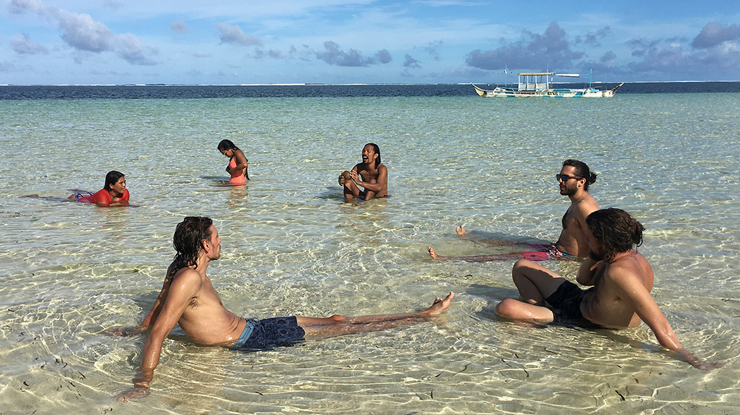 His new home, the island of Siargao in the eastern Philippines. Dolce vita during the pandemic. © Claudio Sieber
His new home, the island of Siargao in the eastern Philippines. Dolce vita during the pandemic. © Claudio Sieber
And do you still maintain friendships in Switzerland? Is that even possible from such a distance?
Claudio: "Maintain" is probably not the right word. We occasionally talk or write. What's more important is the certainty that a visit to Switzerland will be met with time and that support will be given in times of need.
You never know what's going to happen in life. Is a return to Switzerland conceivable for you?
Claudio: Every long-term traveler eventually has to reintegrate into a community; otherwise, one becomes (I dare to say) somewhat strange. But establishing my new base on the other side of the world on a small tropical island was rather unforeseeable. Unfortunately, with my new profession, I couldn't afford the fixed costs in Switzerland. I would have to completely change direction and start setting an alarm clock again. I really enjoy being the master of my own time and living in a place where others want to go on vacation... And I'm not giving that up easily.
To be honest, I don't even know exactly what I'll be doing next week. And by the way, if someone had asked me 10 years ago how I see my future today, I would never have guessed that I would have a new home in one of the most vulnerable countries in the world. Siargao Island is and will remain my base for the foreseeable future, that's for sure. But even during the construction of my house, I was aware that despite my little paradise here, I didn't want to pack up my traveling sails or give up my still-young vocation. I already have a new long-term project in the works. Planning too far ahead probably won't pay off; in 5 years, artificial intelligence will probably challenge my livelihood, and I'll become a landscaper or an online life coach. Who knows?

